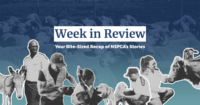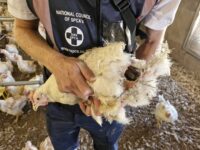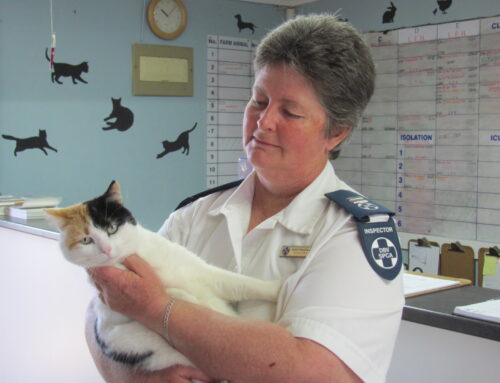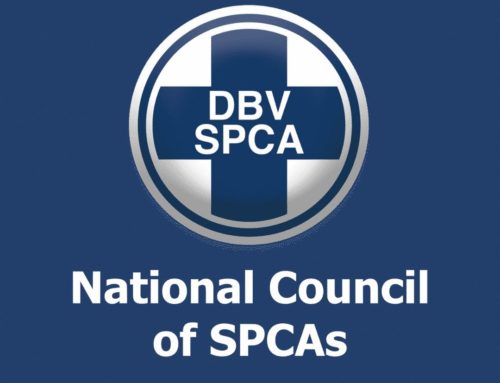The National Council of SPCA’s is opposed to all forms of farming and animal husbandry practices which causes suffering or distress to animals or which unreasonably restrict their movement or their behavioural patterns which are necessary for the well-being of the species concerned. Petting farms often claim that the purpose for the petting farm is to educate children and youth about the importance of looking after animals in a manner so they will develop a passion for animals.
But how educational is a petting farm? It is hard to say that looking at a duck who was meant to live on a ponds or in the wild, but is now limited to a wire pen and a dish of water, gives children a true understanding of how animals live in their natural environments. What children really learn when they see animals in petting farms is how frightened animals behave in captivity and that it is acceptable for them to be stressed simply for entertainment?
Caged animals suffer from boredom and disorientation. Pigs confined to small spaces and deprived of the company of other pigs can become destructive and dangerous resulting to the animals suffering and stressing unnecessarily. Separated from normal social groups and natural habitat, the stress of captivity is heightened by unusual noises, closeness to animals of other species, and lack of shelter where animals can avoid contact with humans if they choose.
In most petting farms children can walk right up to an animal enclosure and put their fingers through the wires. There is rarely enough staff to ensure that visitors do not harm the animals or to protect the hapless bunny who is picked up and dropped by an excited child. Besides ignoring the social and behavioural needs of animals, their physical needs are often neglected. Shelter from wind and sun, especially during the summer months, is crucial for many species. And there are other concerns such as transportation, overcrowding, inadequate bedding and lack of veterinary care.
Some petting farm operators perpetually breed or purchase animals so that they will have an endless supply of “cute babies” to draw crowds. These babies are pre maturely removed from their mothers, denying them the natural socialization process needed for normal development and these frightened young animals are hauled all over the place for human entertainment. That means that animals who get older or become more difficult to handle are often disposed of – that is, abandoned, killed or given away to make room for crowd-pleasing babies.
The National Council of SPCA’s considers that the welfare of an animal includes its physical and mental state and that good animal welfare implies both fitness and a sense of well-being. We believe that an animal’s welfare should be considered in terms of the five freedoms which are;
- Freedom from hunger and thirst – by ready access to fresh water and a diet to maintain full health and vigour.
- Freedom from discomfort – by providing an appropriate environment including shelter and a comfortable resting area
- Freedom from pain, injury or disease – by prevention, by rapid diagnosis and treatment.
- Freedom to express normal behaviour – by providing sufficient space, proper facilities and company of the animal’s own kind.
- Freedom from fear and distress – by ensuring conditions and treatment which avoid mental suffering.
The National Council of SPCA’s believes that petting farms exploit animals for entertainment and we are opposed to any degree of confinement or the use of any animal in sport, entertainment or exhibition likely to cause distress or suffering or which may affect the animal’s welfare. The exploitation of animals for human entertainment sends children and youth a dangerous message that it is okay to take advantage of those who are weaker than us. There are plenty of fun and entertaining activities that can be provided that will promote kindness rather than callousness and will not harm any animals.
If you are as passionate about animals and their well-being as we are, consider supporting our causes by donating.
Latest News Posts
Will You Be the One Who Takes Action?
Most people will scroll past this. But will you be the one who stands up for animals?
Animal welfare isn’t always in the spotlight, but it changes lives – for every neglected, abused, or suffering animal we help. Our teams work tirelessly, often behind the scenes, ensuring animals across South Africa are protected.
This work is relentless. The challenges are immense. But with more hands, hearts, and resources, we can do even more.
The equation is simple: the more supporters we have, the greater our reach, the stronger our impact.
Be part of the change. Become an NSPCA Project Partner today. From just R50 per month, you can help ensure that no animal suffers in silence.







